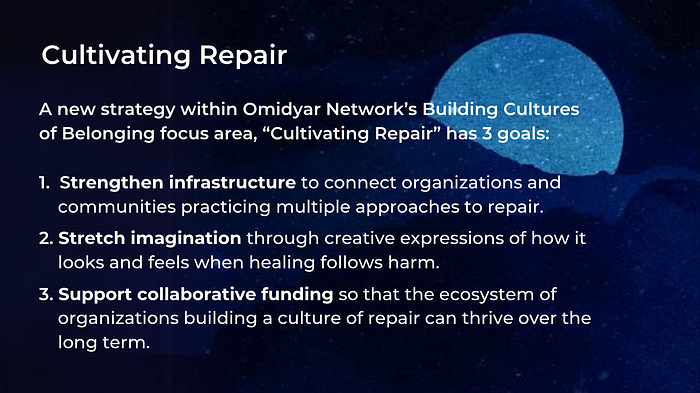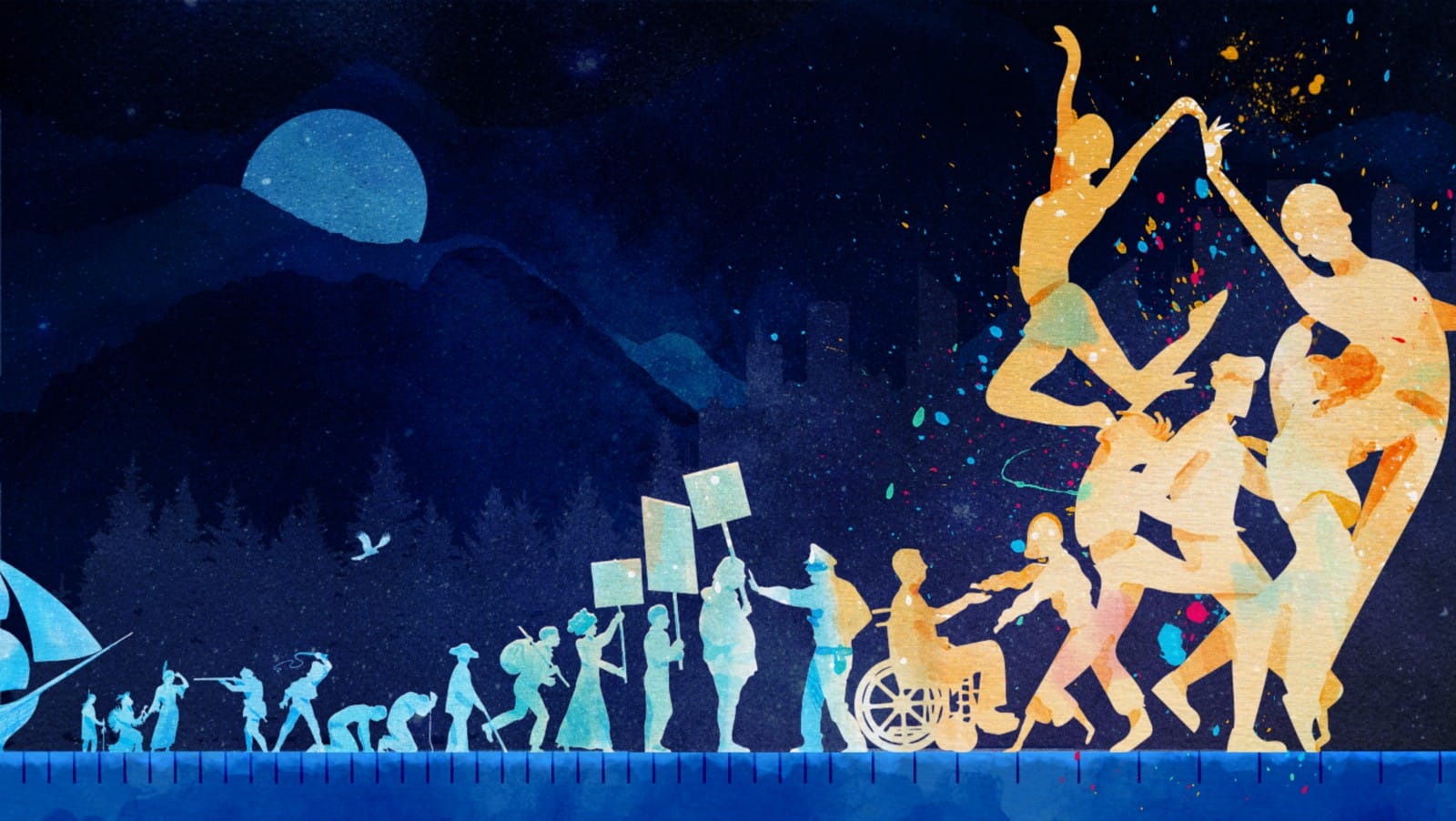A new strategy within Omidyar Network’s Building Cultures of Belonging focus area, “Cultivating Repair” will begin with a participatory learning cohort to explore the multiple seeds of repair and healing taking root in the United States. Learn more and submit nominations by February 1, 2024.
By Vanessa Mason and Fanta Condé
Omidyar Network is deepening our commitment to create a more inclusive and equitable society with the launch of Cultivating Repair, a new strategy within our Building Cultures of Belonging focus area announced last year. Alongside Responsible Technology and Reimagining Capitalism, the overarching goal of Building Cultures of Belonging is to invest in the people, institutions, and infrastructure equipping our diverse society to turn toward one another rather than against each other.
Our approach to Building Cultures of Belonging follows two interconnected pathways. “New Belonging” supports the next generation of leaders, earlier-stage ideas, and civic infrastructure for creating a society where everyone belongs. Emerging from several years of exploration and incubation, “Cultivating Repair” will support a growing ecosystem of efforts to heal past and present-day harms stemming from the legacies of colonialism and slavery in the United States. Together, these pathways move us toward a future where each of us feels connected, equal, and respected.
Today we are excited to open nominations for The Cultivating Repair Catalyst Initiative (a fiscally sponsored project of Amalgamated Foundation), which combines general operating support with a participatory learning cohort that brings together organizations practicing multiple pathways for repair and healing.
The Soul of Repair
“Break a vase, and the love that reassembles the fragments is stronger than the love which took its symmetry for granted when it was whole.” — Derek Walcott
Across the United States, we are seeing courageous efforts to repair and heal America’s deepest wounds, the multi-generational harms of colonialism and slavery. Repair encompasses a holistic range of practices for acknowledging past and present harms, taking accountability for changed behavior, and redressing harms. We practice repair in many different ways — through the stories we tell, the memories we enshrine, how we gather, in rituals of grief and celebration. Repair can also shape a community’s practices and policies, the structures we build up, and the structures we take down.

Our “Cultivating Repair” strategy at Omidyar Network has three core goals: First, we hope to strengthen infrastructure to connect organizations and communities practicing multiple approaches to repair. Second, we aim to stretch imagination through creative expressions of how it looks and feels when healing follows harm. Third, we will support collaborative funding so that the ecosystem of organizations building a culture of repair can thrive over the long term.
Repair is hard, delicate work. Just as we can neglect repair in our personal relationships, the United States has a cultural habit of collectively avoiding repair, whether by hiding history, refusing to acknowledge wrongs, or refraining from making amends. This old habit has allowed the harms of colonialism and slavery — and the poison of racial hierarchy at their roots — to persist and evolve under modern guises. Indigenous and Black communities have most directly, deeply, and disproportionately experienced these harms across generations.
Black and Indigenous people have also been at the forefront of efforts to bring all communities into a shared journey of healing and repair. Movements for repair and healing in the United States have a rich history that is is dialogue with global wisdom from South Africa and New Zealand, Colombia and Germany, Canada, Rwanda, and far beyond. In our own learning journey at Omidyar Network, we have been fortunate to walk alongside courageous partners and grantees who show what it takes to cultivate repair:
- Cultivating multiple expressions of repair. With repair, there is no one-size-fits-all. An isolated focus on a single remedy — such as addressing material harms without also addressing relational and cultural harms — is akin to a one-walled house.
- Cultivating healthy relationships. Separation from loved ones, communities, land, and cultural traditions creates multi-generational harms, which require the patient rebuilding of trust, connection, and safety in all our relations.
- Cultivating repair over longer time horizons. Rather than seeing repair as a single action or event, we need to embrace a generous time frame that recognizes the long legacies of oppressive systems and creates space for healing to occur.
- Cultivating space for imagination. We need to exercise individual and collective imagination “to break free,” as adrienne maree brown describes, rather than being “trapped inside someone else’s imagination” where there is no room for healing.
- Cultivating new habits and practices. Experience from around the world teaches us that repair becomes customary only through practice, as we learn to face uncomfortable truths and feel hard emotions on the path to healing.
As we begin this journey, we are turning to you — the people and organizations embodying the soul of repair.
Call for Nominations
Today we are excited to open nominations for The Cultivating Repair Catalyst Initiative (a fiscally sponsored project of Amalgamated Foundation). The heart of this initiative is a participatory learning cohort made up of organizations at the forefront of practicing repair for harms stemming from colonialism and slavery in the United States. For this cohort, we are most interested in learning alongside emerging organizations and projects eager to learn how their approach relates to the many expressions of repair practiced by other communities and cultural traditions.
Organizations selected to take part in the cohort will receive $100,000 in unrestricted grant support, a $10,000 wellness stipend, and cohort-driven technical assistance. To guide the selection process and shape the learning journey ahead, we are honored to introduce the initiative’s Advisory Council:
- Tanya Chung-Tiam-Fook (Akawaio), Co-Holder, 7 Gen Cities
- Rashida James-Saadiya, Executive Director of Muslim Power Building
- Michael Johnson (Three Affiliated Tribes of North Dakota, White Earth Nation), Chief Strategy Officer, IllumiNative
- Dr. Megan Ming Francis, Associate Professor of Political Science at the University of Washington
To learn more and self-nominate your organization, visit the Cultivating Repair Catalyst Initiative page hosted on the JustFund platform. JustFund’s streamlined Common Application gives you the option of being considered for this opportunity as well as many other grant opportunities on their platform. To nominate an organization you are not a part of, complete this short form to generate an email invitation for the organization.
Learn more and submit nominations via JustFund by February 1, 2024.
For questions about the call for nominations, please see the JustFund page. To learn more about “Cultivating Repair” and explore partnership as a funder, please contact Vanessa Mason at [email protected].
Gratitude
We would like to express our deep gratitude to all the people and partners who have opened and shaped this path:
- Simone Hill, Janice Tolbert, and Manna Selassie for laying foundations for this work several years before we joined Omidyar Network.
- Aria Florant, Trevor Smith, and the team at Liberation Ventures for building a culture of repair.
- Edgar Villanueva and the Decolonizing Wealth Project for making the case for money as medicine.
- Crystal Echo Hawk and IllumiNative for unlocking Native narratives and creativity to advance justice and equity.
- Malkia Devich Cyril, whose Radical Loss Movement Building Project reveals the transformational power of grief.
- Richard Wallace and Equity and Transformation for centering the voices and power of system-impacted people to create a more just society.
- Alexis Flanagan and Resonance Network for creating spaces to imagine and practice a world beyond violence.

